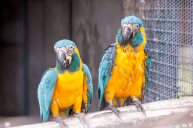A bird species that hasn't existed in the wild for nearly 40 years has finally returned to its natural habitat. It's the first time since the 1980s that the bird species existed outside of captivity.
The Zoological Society of London recently released a press release about the bird species. Experts released six sihek (Guam kingfisher) into the Palmyra Atoll tropical forests. The Sihek Recovery Program is looking to restore the species to its natural environment. The Sedgwick County Zoo in Wichita, Kan. previously cared for Four female and five male sihek birds.
After months at the zoo, experts determined that six of the bird species was fit enough to survive in the wild. From there, experts transferred the birds from Kansas to "temporary aviaries" at Cooper Island. The birds spent weeks there getting adapted to the new environment. Experts believe that the birds will pick out territorial zones early in the wild. The experts have fitted the animals with a radio tracker. They'll use it to monitor them in the wild and learn how they interact and survive.
Bird Species Introduced
Experts plan to release the other animals back into the wild as well when they're ready. The ZSL's Institute of Zoology and Sihek Recovery Program Team Chair Professor John Ewen called the event "decades in the making."
He said, "Wildlife globally is under threat, and the success of seeing these birds fly in the wild once more highlights just how zoos, scientists and conservationists - working with governments and decision-makers - have the power to protect species and take huge steps in bringing them back from the very brink of extinction."
Charlotte James, one of the birdkeepers, said it was "an honor to be part of this journey." She said, "Having spent long days working around the clock to hand raise these precious birds, it's so incredible seeing them not only fully grown, but also now flying around Palmyra Atoll."
The bird species has faced a long road to this moment. In 1982, they became a part of the Guan Endangered Species Act. Just a few short years later, they went extinct in the wild. A brown tree snake may have played a role.




